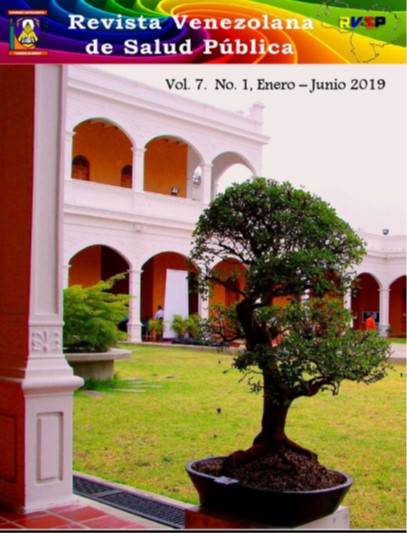The convergence of the traditional sociomedical and the contemporary biomedical paradigms: is it possible?
Keywords:
traditional medicine, scientific medicineAbstract
This essay lays out some thoughts regarding the social healing practices that coexist with scientific Medicine in Venezuela, pursuant to
what has been expressed by expert doctors, young specialist doctors and users of the healthcare services in the Socialist Venezuela of the
21 st century. The interest of such research focused on interpreting with a critical spirit the meanings of the medical discourse regarding the
characteristics of scientific and pre-scientific medicine, as well as the users’ experiences who combined scientific medicine with
traditional medicine practices in the search for a solution to their health problems. I took the critical analysis of discourse described by
Teun Van Dijk as core of the investigation. I found differences between medical voices: While expert doctors centered their attention on
the importance of scientific Medicine, its achievements, challenges and contradictions, thinking about the need to apply scientific
medicine in order to reveal truths hidden by traditional practices, young doctors focused their attention on the supremacy of scientific
training during medical education, the discrimination suffered by traditional healing practices under medical training and medical
practice, as opposed to the frequent use of traditional healing practices in the rural and urban populations they have assisted. The
concerns expressed by users of the healthcare services revealed a complementary coexistence of Medicine and traditional practices. To
conclude, the horizons of change that might a complementary coexistence be useful for the reconstruction of the Healthcare System in
Venezuela were presented: Critical & Theoretical Integration of the Contemporary Biomedical and Traditional Sociomedical Paradigms
from an interdisciplinary point of view.
Downloads
References
Prentice Hall. 2006
Gadamer H. Verdade e Método. Petrópolis: Vozes. 1999
Habermas J. Dialéctica y Hermenéutica. Porto Alegre: Editora
LPM. 1987
Van Dijk T. Discurso, Conocimiento, Poder y Política. Rev.
Investigación Lingüística. N° 13.2010: 167-215
Perdiguero E. Una Reflexión sobre el Pluralismo Médico. En
Fernández, G (comp). Salud e Interculturalidad en América
Latina. Antropología de la Salud. Quito: Ediciones Abda –
Yala. 2006.
Alves P. Itinerario Terapéutico e os Nexus de
Significados da Doenca. Rev. de Ciencias Sociais.
Número 42. 1994: 29-43.
Menéndez E. El Malestar Actual de la Antropología. Revista de
Antropología Social 11. 2002: 39 - 87.
Madel L. Natural, Racional, Social: Razao Médica e
Racionalidade Científica Moderna. Sao Pablo: Editora Hucitec.
2004.
Clarac J La Enfermedad como Lenguaje en Venezuela. ULA.
Mérida. Consejo de Publicaciones. 1992.
Bachelard G. La Formación del Espíritu Científico.
Contribución a un Psicoanálisis del Conocimiento Objetivo.
Buenos Aires: Argos. 2010.
Nicolescu B. Transdisciplinariedad. Centro Internacional de
Investigación y Estudios Transdisciplinarios. CIRET. 1998.
Almajdalawi A. Reflexiones sobre la Interdisciplinariedad.
Valladolid. 2009. (02. Nov. 2016) Disponible en: http:
www.gesic.uva.es/wikis /yannis/ images/c/cf/
Ander Egg A. Interdisciplinariedad en Educación.
Barquisimeto: Ediciones Gema. 2010.
Balza A.Complejidad,
Transdisciplinariedad
y Transcomplejidad: Los Caminos de la Nueva Ciencia. San Juan
de los Morros: Fondo Gremial. APUNESUR. 2010.
Carvajal Y. Interdisciplinariedad: Desafío para la Educación
Superior y la Investigación. Rev. Luna Azul. – 2472. ISNN
1909. N° 31. Julio- diciembre 2010.
OMS. Estrategias de la OMS sobre Medicina Tradicional.2014-
2023 .2013 (02 noviembre. 2016) Disponible en: apps.who.int. /
medicinedocs/
OMS. (2008). Technical Brief N°1. Integrated Health
Services: What and Why? (22 Noviembre 2014).
Disponible en: http: www.WHOint/health systems/
service deliveryteachbrief.pdf.
Published
How to Cite
Issue
Section
Derechos del/de autor/es a partir del año de publicación
Esta obra está bajo la licencia:
Creative Commons Reconocimiento-NoComercial-CompartirIgual 4.0 Internacional (CC BY-NC-SA 4.0)
Las opiniones expresadas por los autores no necesariamente reflejan la postura del editor de la publicación ni de la UCLA. Se autoriza la reproducción total o parcial de los textos aquí publicados, siempre y cuando se cite la fuente completa y la dirección electrónica de esta revista. Los autores(as) tienen el derecho de utilizar sus artículos para cualquier propósito siempre y cuando se realice sin fines de lucro. Los autores(as) pueden publicar en internet o cualquier otro medio la versión final aprobada de su trabajo, luego que esta ha sido publicada en esta revista.



